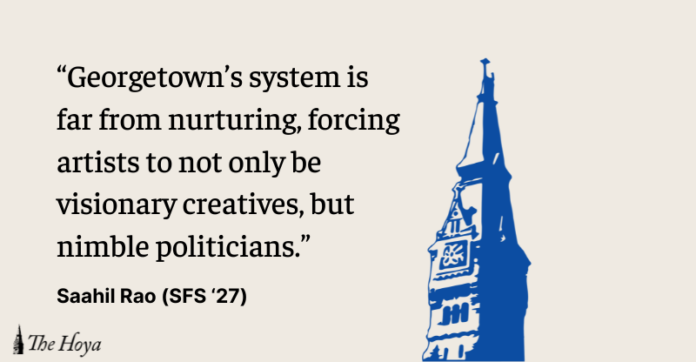My little brother, a junior in high school, was planning on leaving at intermission. But, when the show ended, he was the first to spring out of his seat, pounding his palms in admiration. “Off The Record,” the third annual production of Georgetown University Asian American student musical group (No) Pressure Creatives (NPC), was a triumph of talent, hard work and serendipitous circumstance.
From an outsider’s perspective, however, it didn’t always seem like it was going to work out. Its story — and success—reveals much of the tribulations creative projects face on campus: the need for new streamlined funding, support systems and faith in the artists.
“Off The Record” follows two precocious, young singers — Ben Chaturvedi and Ariel Kobayash, played by a vibrant Shlok Pathak (CAS ’28) and Emily Young-Squire (CAS, MSB ’27) — who are trying to make it in the music business. Similarly, the story of this musical’s production follows a ragtag group of Georgetown students — lead ably by Executive Producer Minato Shinoda (MSB ’26) and Executive Director Lucy Zhang (CAS ’26) — as they try to break into the Hilltop performing arts scene. This year, moving out from the banner of the reliably deep-pocketed Asian American Student Association (AASA), NPC went independent, entering new club development (NCD) under the Performing Arts Advisory Council (PAAC). And what was the price to pay for such ambition? A loss of financial stability, as NCD clubs under PAAC don’t receive a budget until they become recognized as official organizations.
There’s a great philosophical tension between money and artistic vision, both in the show’s plot and its production, exploring the question of how art-funding institutions nurture original talent and thinking. Georgetown could certainly do a better job at doing so. Performing art is difficult — and ridiculously expensive — to perform as is. Our most prestigious venue, Gaston Hall, doesn’t have built-in audiovisual (AV) systems, leading to the need to contract expensive, third party service providers, such as Optimum. Initial quotes are usually thousands of dollars, prices which students often struggle to negotiate. While students at our peer institutions are allowed to use reasonably-priced private security services, Hoyas are also forced to use the Georgetown University Police Department (GUPD) for venue security, who charge a patently absurd $65.65 hourly rate. For “Off The Record,” this all culminated in a final cost of $9,187.04, all of which its showrunners had to raise in donations.
Despite this high cost, NPC refused to compromise on its artistic vision. When it received questions about whether it could fill Gaston, an expression-of-interest-in-attendance form was organized and received hundreds of responses. When they faced questions from Diversity Fund Committee Members (including myself!) about the financial ramifications of their decision to go independent from AASA, NPC stood steadfast in their decision to prioritize their integrity and independence. And when push came to shove, NPC’s operational team supplicated relentlessly, eventually receiving donations from nine different sources, including the university president’s and provost’s offices.
Money and interest to nurture new creative projects exist on campus. But the lack of a single source or institution able to foster new performing arts groups leads to a painful song and dance routine.
Georgetown’s administration — or student body — ought to create a sort of one-stop shop for new creative projects. Under our current process, new productions on campus require not only creative talent, but deep and intense institutional knowledge to succeed. Georgetown’s system is far from nurturing, forcing artists to not only be visionary creatives, but nimble politicians.
In the end, it was GUSA’s Diversity Fund that provided the largest donation to “Off The Record.” As I sat in my seat in Gaston, the show 20 minutes late to start, thinking about the almost $10,000 cost of the whole endeavor, a sinking feeling developed in my stomach. “What if the show was bad?” I thought to myself. “What if this was all a waste of money?” But by God I was wrong. At the end of the night, the showrunners were organizational geniuses, the cast mini-celebrities and the director an auteur. Since “Off The Record” could only afford to run for one night, I can’t recommend you see the show. Instead, I urge politicians and administrators to trust artists to do what they do best. Simplify the process, give them what they need and for a few fleeting moments, they’ll dazzle your world away.
Saahil Rao is a sophomore in the School of Foreign Service. This is the third installment of his column “Institutions and Their Ills.”

